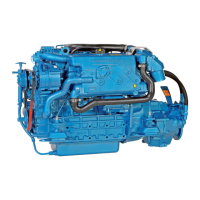21
COOLANTS
WARNING !
Products not fullling the demands in this section may
lead to faults and damage occurring in the cooling
system. This can lead to the invalidation of Nanni’s
warranty for faults and damage caused by the use of
inappropriate coolant.
COOLANT DRAIN INTERVALS
Drain and flush the cooling system of the engine and
rell with fresh coolant at the indicated intervals, which
depends of the coolant used and of the maintenance
schedule service of the engine.
WATER PROPERTIES
Water properties are important to the efciency of the
cooling system. Distilled, deionized, or demineralized
water is recommended for mixing with ethylene glycol
or propylene glycol base engine coolant concentrate.
IMPORTANT !
• Do not use cooling system sealing additives, neither
antifreeze containing sealing additives.
• Do not mix ethylene glycol and propylene glycol base
coolants together.
• Do not mix coolants of various brands and makes
together.
• Do not use coolants containing nitrites.
WATER PROPERTIES TO MIX WITH
COOLANT CONCENTRATE
Engine coolants are a combination of three chemical
components: ethylene glycol (EG) or propylene glycol
(PG) antifreeze, inhibiting coolant additives, and
adequate “quality” water.
Do not use bottled drinking water as it often contains
higher concentrations of dissolved solids.
Water used in the cooling system should meet the
following minimum specications for quality :
Chlorides < 40 mg / L
Sulfates < 100 mg / L
Total dissolved solids < 340 mg / L
Total hardness < 170 mg / L
pH 5,5-9,0
When mixing coolant concentrate with water, do not
use less than 40 % or greater than 60 % concentration
of coolant. Less than 40 % is inadequate for corrosion
protection. Greater than 60 % can result in coolant
gelation (solidication by cooling) and cooling system
problems. As a general rule, a mixing of 50/50% is
preferred whenever possible.
S03 FLUIDS

